(Ray Brandes' exclusive account of a San Diego underground supergroup. Read the full version in Che Underground's Related Bands section.)
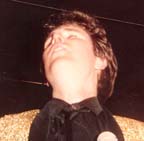 Part impresario, part cheerleader and all entertainer, Beat Farmer, Penetrator and Crawdaddy Dan McLain had such an impact upon the San Diego music scene in the late ‘70s and early ‘80s that it is difficult to imagine how it might have developed without him. Those who knew him well speak of him reverentially — as a forefather, a catalyst and revolutionary. But it was his personality that endeared him to everyone he met.
Part impresario, part cheerleader and all entertainer, Beat Farmer, Penetrator and Crawdaddy Dan McLain had such an impact upon the San Diego music scene in the late ‘70s and early ‘80s that it is difficult to imagine how it might have developed without him. Those who knew him well speak of him reverentially — as a forefather, a catalyst and revolutionary. But it was his personality that endeared him to everyone he met.
Joe Piper, guitarist for the Crawdaddys, Decagents and Bogtrotters, remembers McLain fondly: “Easygoing, friendly, funny and personable, he had charisma out the ass. Dan really was one of the most decent, good-natured guys I've ever had the pleasure to know. He was an old school kind of guy. He was a gentleman and a scholar, a man's man. Possibly he'd heard that old saw that a true gentleman will engage in an occupation that risks his life. Would that explain those precarious traverses across beer-slick bar tables like so many ice floes?”
Indeed, McLain had a commanding presence, an almost mythical sense of humor and a powerful charisma that ultimately proved too large to be contained by a provincial town like San Diego. The rest of the world would come to know him as Country Dick Montana, but long before he led the Beat Farmers to international stardom, McLain began developing an onstage persona that would serve as his trademark until his premature passing in 1995 at age 40.
In the late spring of 1980, McLain, who had recently left the Crawdaddys to drum full time for the Penetrators, was restless for yet another outlet for his irrepressible personality. For some time he had been concocting a plan to form a band for a single gig that would consist only of members of current "working" bands in the local punk scene. The band would have a horn section and another drummer so he could sing lead. And he wanted to call it "The Sensational Big M.R. and his All Bitchin’, All Stud, All Stars." Piper says, “It was pretty much all about promoting a sense of community and camaraderie amongst the guys. Just an excuse to get together and have fun with the boys.”
Penetrators keyboardist and saxophonist Jim Call remembers that the choice of name was not entirely whimsical. “To qualify for membership you had to be in a band — be a ‘star,’ ” says Call. “You had to be relatively studly. And if you were a studly star, you were by definition ‘bitchin.’ This idea was all in place before Dan chose anyone. There was very little evolution to the band. The concept arrived, Minerva like, fully formed from Dan's active imagination. The realization varied very little from the concept.”
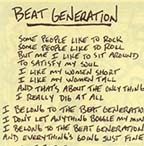 Gary Heffern, Penetrators lead singer and All Stars choir member, recalls a particularly strong influence upon McLain. “Dan was a huge Dean Martin fan, and so he wanted to try his hand at showbiz, in a group with horns.” Joe Piper theorizes that a primary impetus for the formation of the All Stars was to provide McLain with a forum to sing Bob McFadden and Dor’s 1959 novelty jazz record, “The Beat Generation”:
Gary Heffern, Penetrators lead singer and All Stars choir member, recalls a particularly strong influence upon McLain. “Dan was a huge Dean Martin fan, and so he wanted to try his hand at showbiz, in a group with horns.” Joe Piper theorizes that a primary impetus for the formation of the All Stars was to provide McLain with a forum to sing Bob McFadden and Dor’s 1959 novelty jazz record, “The Beat Generation”:
Some people like to rock. Some people like to roll.
But me, I like to sit around to satisfy my soul.
I like my women short. I like my women tall.
And that's about the only thing I really dig at all.
Piper also reminds us that McLain was first and foremost a showman: “He was the first person I knew who really understood he was an entertainer and that, say what you will, when you get up on stage, you're in show biz. Dan was the first person I knew who truly understood that and owned it and was absolutely unapologetic about it. He was a genuine, generous, thoughtful, funny guy. I believe he also knew that wasn't reason enough to expect people to fork over their hard earned cash in order to experience ‘The Wonder of Him’. He knew that he had to reinvent himself into something that people would find entertaining and would ultimately prove popular enough to pay the bills. And so we got Monty Rocker, The Sensational Big M.R, and Country Dick.”
McLain sent word to his friends in local bands, enlisting the services of some of the scene’s most recognizable faces. Guitarists Mark Neill from the Unknowns and David Farage from DFX2 were among the first to join. The Penetrators’ Chris Sullivan (bass) Tim from Private Sector (drums) and a horn section, dubbed the Stax of Sax and consisting of Call and Mark from Private Sector were recruited. A choir, featuring the vocal talents of Heffern, the Unknowns’ Bruce Joyner and DFX2’s Douglas Farage, rounded out the line-up.
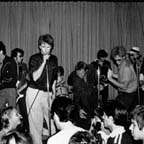 Rehearsals were held at McLain and Heffern’s infamous punk rock house in Chollas View, near 54th and Redwood Streets, and were well-lubricated to say the least. Jim Call remembers that the band members took the All Stud moniker quite seriously. “There was lots of beer, and plenty of bourbon drinkers too. It was understood that the drinking should be manly. As such, there were no wine coolers, or Mai Tais, or flavored anything. Whiskey and beer were de rigeur.”
Rehearsals were held at McLain and Heffern’s infamous punk rock house in Chollas View, near 54th and Redwood Streets, and were well-lubricated to say the least. Jim Call remembers that the band members took the All Stud moniker quite seriously. “There was lots of beer, and plenty of bourbon drinkers too. It was understood that the drinking should be manly. As such, there were no wine coolers, or Mai Tais, or flavored anything. Whiskey and beer were de rigeur.”
The term “rehearsal” is perhaps a bit too precise for what Call describes as “lurching approximations of songs.” Call says, “We were all from DIY punk and new wave San Diego bands. Some of us had very limited skills on our instruments. Many of us, really. There were some who had been in bands predating that era and were a little more accomplished. Those guys were the ones who first picked out the chords and beat — and the rest just tried to keep up as best we could. Arranging consisted of trying really hard to make it sound ‘right.’ ”
The project was clearly McLain’s baby from conception onwards. Call says, “There was nothing democratic about it. We all deferred to Dan. We all knew he was on to something special.”
McLain chose the songs, which dealt largely with “manly themes,” and which often had to be adjusted to fit his basso profundo. These tunes included Johnny Cash’s “Folsom Prison Blues,” Tennessee Ernie Ford’s “Sixteen Tons,” and “Mondo,” a perverse reworking of Lorne Greene’s 1964 novelty record “Ringo,” with new lyrics about a masturbation contest. There were a couple of times, however, when McLain allowed some of the Studs to make song suggestions. According to Penetrators bassist Chris Sullivan, “I do remember saying that we had to do Elvis’s ‘Burnin' Love,’ or I wouldn't play. Dan said something like, ‘Fine Mr. Loverboy, we will do Burnin' Love — just keep all your Surf Bunnies at high tide!’”
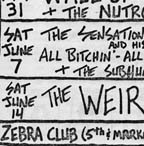 The band, officially named The Sensational Big M.R. and his All Bitchin’ All Stud All Stars, made its debut performance on Saturday, June 7, 1980, at the Zebra Club with Canadian punk band the Subhumans. The All Stars muscled through the aforementioned songs, plus exuberant versions of Gene Vincent’s “Cruisin’ ” and Conway Twitty’s “Lonely Blue Boy.” The packed club jeered, shouted and sang along. Heffern remembers, “Dan told all the girls to start screaming — so they did! I think everyone either liked it or was confused by it, but it was a definitely a defining moment of the making of Country Dick.”
The band, officially named The Sensational Big M.R. and his All Bitchin’ All Stud All Stars, made its debut performance on Saturday, June 7, 1980, at the Zebra Club with Canadian punk band the Subhumans. The All Stars muscled through the aforementioned songs, plus exuberant versions of Gene Vincent’s “Cruisin’ ” and Conway Twitty’s “Lonely Blue Boy.” The packed club jeered, shouted and sang along. Heffern remembers, “Dan told all the girls to start screaming — so they did! I think everyone either liked it or was confused by it, but it was a definitely a defining moment of the making of Country Dick.”
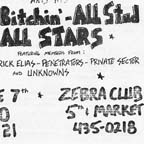 Call adds, “The band, 13 unwieldy punk-rock musicians, was anything but tight. But we played with pretend booze-fueled gusto and punk rock enthusiasm and it was obvious to all that we were having a grand time — most of all the Big M.R. himself.”
Call adds, “The band, 13 unwieldy punk-rock musicians, was anything but tight. But we played with pretend booze-fueled gusto and punk rock enthusiasm and it was obvious to all that we were having a grand time — most of all the Big M.R. himself.”
Read the full story of The Sensational Big M.R. and his All Bitchin’ All Stud All Stars!
— Ray Brandes
Photos and flyers used courtesy of Mark Zadarnowski and Joe Piper. ABASAS photo at the North Park Lions Club by Harold Gee.
Also by Ray Brandes: